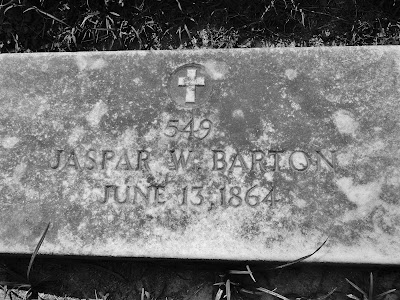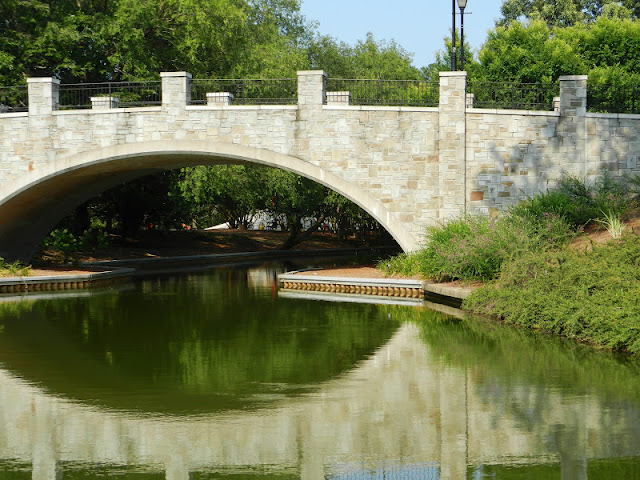Over three days, we visited the Naval Museum in Norfolk, the settlement of Jamestown, and the battlefields of Yorktown, Spotsylvania, Chancellorville, and Fredricksburg. By Friday afternoon, my mind was awash in bloody statistics of men dead in battle. The numbers were overwhelming. Over 50,000 men dead at Gettysburg. Almost 30,000 at Fredricksburg. Over 8,500 American men died in British prisons in the Revolutionary War.
How can you even take in numbers like that? By the afternoon of the second day I was ready to declare that I couldn't take one more battle site tour. My heart hurt and I did not want to hear one more sad story.
Plus, Virginia was in the middle of a heat wave and I was tired of being hot and sweaty.
And then, on the third day, I reluctantly tagged along on some walking tours around the Civil War sites in the vicinity of Fredricksburg. When you are standing on the very field where tens of thousands of men died, it is impossible to remain hard of heart. If, I thought to myself, I cannot stand here and honour these men in my heart and shed a tear or two for the lives they didn't get to live, for what purpose did they die? It matters not for which side they fought. They all experienced the horror of battle, the cries of pain, the terror of a futile attack, the cold, the heat, the deprivation of war.
And so, I drank it in.
I hid behind monuments and cried a little.
I took photographs like a woman possessed.
I listened to every word of the National Park tour guides, who were passionate about their subjects and brought the stories of the battles and the men who fought them to life.
If you ever go back east and visit these sites, take the free walking tours. Trust me, you will be glad you did.
And so, I paid homage to all of the men who have died in wars that were started by men in high places. And to those who came home but were irreparably damaged.
And to the families they left behind.
There is a poem that is found in Confederate cemeteries all over the South. It was written by a man named Theodore O'Hara to honour Kentuckians who died in the Mexican War of 1846, but has been used to remember the fallen on both sides of the Civil War. It is also quoted on the gateway to Arlington National Cemetery.
The muffled drum's sad roll has beat
The soldier's last tattoo;
No more on Life's parade shall meet
That brave and fallen few.
On fame's eternal camping ground
Their silent tents to spread,
And glory guards, with solemn round
The bivouac of the dead.
No rumor of the foe's advance
Now swells upon the wind;
Nor troubled thought at midnight haunts
Of loved ones left behind;
No vision of the marrow's strife
The warrior's dreams alarms;
No braying horn or screaming fife
At dawn shall call to arms.
Rest on embalmed and sainted dead!
Dear as the blood ye gave;
No impious footstep here shall tread
The herbage of your grave;
Nor shall your glory be forgot
While Fame her record keeps,
For honor points the hallowed spot
Where valor proudly sleeps.
Yon marble minstrel's voiceless stone
In deathless song shall tell,
When many a vanquished ago has flown,
The story how ye fell.
Nor wreck, nor change, nor winter's blight,
Nor time's remorseless doom,
Can dim one ray of glory's light
That guilds your deathless tomb.
From: "Bivouac of the Dead"
By Theodore O'Hara, 1847
In memory of
JOHN TURNER
who departed this life
October the 13th
in the Year of our Lord
1781
Aged 30 years
Ah cruel ball so sudden to disarm
And tare my tender husband
from my Arms
How can I grieve too much
what time shall end
by Mourning for so good
so kind a friend
There is no end to the stories.
































































